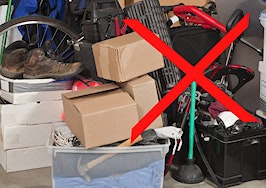I remember, as a small girl, weaving through rows of accumulated junk and newspapers at my grandparents’ house. My brother and I were only permitted into a few rooms — the rest were “off limits.”
The other rooms were so full of clutter that they were more or less unnavigable. I accepted this without any real question of normalcy, as children do. It was not until adulthood that I finally realized that my grandmother was a hoarder.
Closer to home than you think
Studies show that compulsive hoarding affects up to 6 percent of the population. To put this into perspective, a little over 9 percent of the U.S. population suffers from some form of diabetes. Or put another way, 1 in roughly every 20 people suffers from hoarding disorder. Or to put it yet another way, you probably know someone who is a hoarder.
For those of us working in real estate, this means we deal with sellers and tenants suffering from this condition all the time. We have all had a home inspection where corners, or perhaps entire rooms, were inaccessible due to a seller’s belongings.
We have all seen a home so overflowing with stuff that we questioned how someone could possibly live in such conditions. And we have all shown up to a final walkthrough to find a home still hidden under a dumpsters worth of stuff.
What is hoarding?
Hoarding, as defined by the Mayo Clinic, “is a persistent difficulty discarding or parting with possessions because of a perceived need to save them. A person with hoarding disorder experiences distress at the thought of getting rid of the items. Excessive accumulation of items, regardless of actual value, occurs.”
Hoarding can range from mild to debilitating, and it is oftentimes linked to other disorders, such as anxiety and depression. I have personally seen the full spectrum of the disease.
At its best, I have given a seller the extra time to slowly go through their possessions with their closest family members. At its worst, while acting as a buyer’s agent, we dealt with a seller who became so destabilized by the prospect of their financially necessary move and separation from their belongings that they ultimately committed suicide.
While most have hopefully avoided such grim incidents, hoarding is a condition that all agents should be sensitive to. Picking up on the signs of this condition early on in a transaction will benefit all parties involved.
3 signs you seller might be a hoarder
- Your seller is exhibiting signs of distress over discarding items of clutter — and that clutter has rendered spaces in the home unusable.
- Your seller’s belongings are compiled in disorganized piles throughout the home, and they react defensively or combatively when you encourage organization.
- Your sellers shows signs of instability and fear when faced with the prospect of moving, particularly if they will be moving to a smaller home or if a family member or financial distress is forcing the move.
Actions to take when your seller shows signs of hoarding
Set realistic expectations
You or your seller’s family members may assume that the decluttering process will be as simple as renting a dumpster and throwing everything away.
This will likely not be the case. The process will be highly unsettling and emotional for the seller. Hoarders see safety, comfort and value in their possessions. To them, their items are not trash. — keep this in mind when setting expectations that are realistic for all parties involved, including any prospective buyers.
Seek support
Hopefully your seller has a healthy relationship with family members who are already communicating with you and who are willing to be involved in the real estate transaction. Ideal as that is, however, it’s not always the case.
If you suspect that your seller’s condition may impede a successful transaction, seeking additional support and resources may be necessary.
Know when you are in over your head
Hoarding situations are complicated, and taking on a seller with this condition may be more than you can handle.
Be prepared to acknowledge your own limitations before you jump into this type of transaction. Whether or not you decide delve in, it will be a learning experience, and you will be better for it.
For more information about hoarding, click here.
Rita Danielle Steele is the principal broker owner with Steele Realty Consultants International in Providence, Rhode Island. Connect with her on LinkedIn or Instagram.













